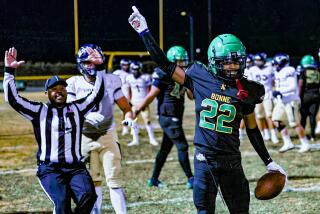Texas A&M; Banned From Bowl and TV for One Year : College football: NCAA penalty is lighter than one Pac-10 imposed on Washington.
- Share via
The NCAA sent a stern message Wednesday to one of its oft-troubled members, Texas A&M;, taking the unusual step of placing the school on probation for five years as a result of rules violations involving the Aggies’ football program.
Only two other schools--Southeastern Louisiana and Upsala College--have received probationary periods of a similar duration from the NCAA.
Despite the lengthy probation, Texas A&M; was given relatively light sanctions by the NCAA Committee on Infractions, which issued its ruling after a yearlong investigation by the NCAA enforcement staff and university officials.
The Aggie football team was barred from playing in a bowl game or appearing on television during the 1994 season. However, Texas A&M; was spared other sanctions, such as cuts in scholarships and recruiting visits.
Texas A&M; players were found to have benefited from a scheme in which a booster arranged jobs requiring little or no work.
A similar scheme was a central element of the Pacific 10 Conference’s case against Washington last year. That case resulted in a ruling by the conference in which the Huskies were barred from bowl appearances for two seasons.
The Aggies, Southwest Conference champions the last three years, finished the 1993 season 10-2 after a 24-21 loss to Notre Dame in the Cotton Bowl.
Speaking at a news conference in College Station, Tex., E. Dean Gage, the university’s interim president, said: “This issue is a single, isolated case, and we regret that this incident will impact negatively thousands . . . who were in no way involved and who are totally committed and supportive of the university’s compliance and institutional control.”
Texas A&M; Coach R.C. Slocum told reporters he was pleased to have the matter resolved because of the recruiting implications.
“We don’t have to hear all the wild speculation and innuendo,” he said.
Nine Aggie players, including star tailback Greg Hill, were found to have received nearly $18,000 in unearned wages from 1990-92 as a result of their employment at apartment complexes operated by Warren A. Gilbert Jr., a Dallas developer. Gilbert was president of the university’s athletic support group--the 12th Man Foundation--at the time the infractions occurred.
The NCAA also found that the university showed a lack of institutional control over its football program by failing to monitor appropriately its jobs program for athletes.
The ruling marks the seventh time that Texas A&M; has received public sanctions because of athletic rules violations--a factor in the Committee on Infractions’ decision to impose such a lengthy probationary period.
The NCAA placed the Aggie football program on two years probation in 1988 for infractions that occurred during the coaching tenure of Jackie Sherrill, who was later forced to resign.
Texas A&M; could have received the NCAA’s so-called “death penalty” for repeat violators, and, according to the Committee on Infractions’ report, the panel gave serious consideration to applying such a sanction. However, the committee backed off because of several factors, including the relatively limited scope of the infractions and the university’s attempt to investigate fully.
More to Read
Go beyond the scoreboard
Get the latest on L.A.'s teams in the daily Sports Report newsletter.
You may occasionally receive promotional content from the Los Angeles Times.










